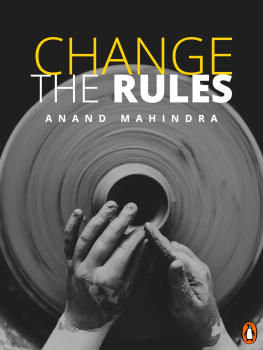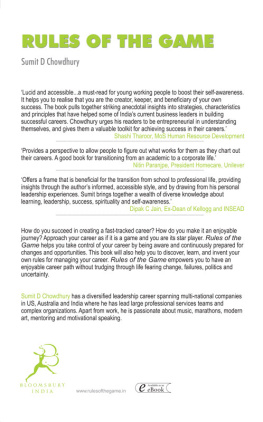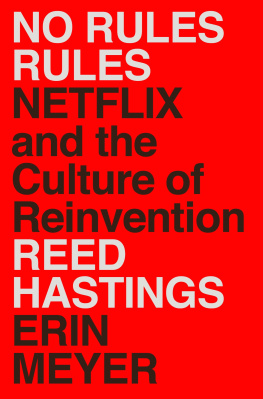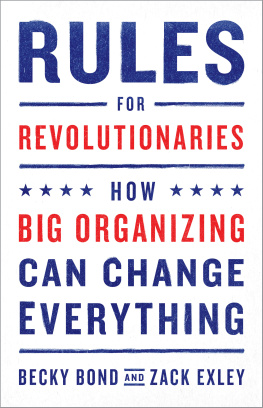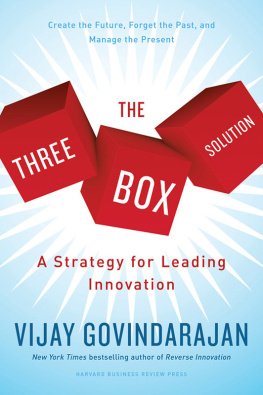Mahindra - Change the Rules
Here you can read online Mahindra - Change the Rules full text of the book (entire story) in english for free. Download pdf and epub, get meaning, cover and reviews about this ebook. year: 2017, publisher: Penguin Books Ltd, genre: Business. Description of the work, (preface) as well as reviews are available. Best literature library LitArk.com created for fans of good reading and offers a wide selection of genres:
Romance novel
Science fiction
Adventure
Detective
Science
History
Home and family
Prose
Art
Politics
Computer
Non-fiction
Religion
Business
Children
Humor
Choose a favorite category and find really read worthwhile books. Enjoy immersion in the world of imagination, feel the emotions of the characters or learn something new for yourself, make an fascinating discovery.
Change the Rules: summary, description and annotation
We offer to read an annotation, description, summary or preface (depends on what the author of the book "Change the Rules" wrote himself). If you haven't found the necessary information about the book — write in the comments, we will try to find it.
Change the Rules — read online for free the complete book (whole text) full work
Below is the text of the book, divided by pages. System saving the place of the last page read, allows you to conveniently read the book "Change the Rules" online for free, without having to search again every time where you left off. Put a bookmark, and you can go to the page where you finished reading at any time.
Font size:
Interval:
Bookmark:



PENGUIN BOOKS

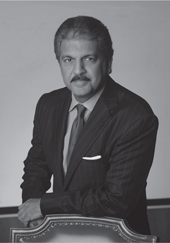
Anand Mahindra is chairman and managing director of Mahindra & Mahindra Ltd. He graduated with honours (magna cum laude) from Harvard College and received an MBA from the Harvard Business School.
Following a number of leadership positions within the Mahindra Group, he was appointed chairman and managing director in 2012. He is the co-founder of the Harvard Business School Association of India and a co-promoter of Kotak Mahindra Finance Ltd, which in 2003 was converted into a bank. He currently serves as the honorary ambassador of Foreign Investment Promotion for the Republic of Korea, a member of the International Advisory Council of Singapores Economic Development Board, a member of the Harvard Global Advisory Council and a member of the global board of advisors of the Council of Foreign Relations, New York.
Anand Mahindra is included in Fortune magazines list of the worlds fifty greatest leaders in 2014. Fortune magazine also named him as one of the top twenty-five most powerful business people in Asia for the year 2011.
His recent awards include the Global Leadership Award from the USIndia Business Council, the Business Courage Award 2012 from the Asia Business Leadership Forum, Business Leader of the Year 2012 from NDTV, and the Forbes India Leadership Awards 2013 Entrepreneur of the Year. He is the first Indian recipient of the Harvard Medal 2014 by the Harvard Alumni Association given for extraordinary service to Harvard University.
The graduating class of 2014 and their families, Mr A.M. Naik, chairman, board of governors, members of the faculty, ladies and gentlemen.
It is almost customary for convocation speakers to terrify their audience by telling them that they are about to begin their lives. If I used that clich with you, it would sound patently unfair, wouldnt it? I would imagine that all of you probably feel as if a good portion of your life has already been well earned and well spent!
The very fact that you were admitted to IIM Ahmedabad means that you have been running the race of life for quite a while now. You probably studied diligently throughout school, worked even harder in college, engaged in a diverse set of extracurricular pursuits, worked strenuously to achieve high scores in the entrance tests, and finally, adopted a back-breaking pace just to make it through the last two years and qualify to wear those robes. The world lies at your feet today.
So let me confirm that you are not fledgling, inexperienced birds about to fly out of the nest and you need not be intimidated by this supposedly imminent and momentous commencement of your lives.
There is, however, a very different danger you face. The danger that forty years from now, you will be reflecting upon your life and declaring to your friends that your days at IIM Ahmedabad were the best days of your life.
Now I am not refuting or challenging the fact that you might have thoroughly enjoyed your stint here. What I wish for you is that things only get better from here onwards. And I want you to hit the ground running and have as few wasted moments as is humanly possible.
I have found that the days that I see now as the wasted days of my life were those when I didnt take an acceptable risk that I could have conceivably taken, when I didnt ask myself if there was a new and different way to do what I was doing, when I didnt set my sights as high as I possibly could have.
To give you an example, let me take you back more than two decades ago, when we formed a joint venture (JV) with Ford Motor to make passenger vehicles. Why did we do that? Well, because at that time, we had only just started making vehicles with hard tops, and were diffident about our capability to transition to the modern car-making world. We needed a mother ship in case our little spacecraft didnt survive out there. Some years later, during the tenure of that JV, when our home-grown Mahindra engineers came up with the concept of the Scorpio SUV, we dutifully sought our JV partners advice and assistance. I will never forget the day we displayed the model of the Scorpio to the top brass at Ford, who had gathered at the tiny facility of a boutique engineering firm in the UK.
We showed them a crude clay model of the Scorpio and shared our development budget with them. They seemed impressed and, right away, the vice chairman of the company offered to depute a team of seasoned Ford engineers to assist us in the development of the vehicle. At that point, the chairman interjected and said, No, lets not send any engineers at all. If we do, this vehicle may come out looking like a Ford car, and costing just as much. If these guys can really develop this car theyve just shown us at the cost they claim they can, then I think we are the ones who should be learning from them.
I owe Ford a debt of gratitude for leaving us to fend for ourselves. Because when I look back upon these events, I know that the choice Ford made put us solidly on the path of self-reliance. But I admit that I have often wondered how things would have turned out had Ford made a different choice.
What if they had not abandoned us to do the Scorpio alone? It is obvious that we would not have built the capabilities we possess today.
So I have asked myself: why did I make that offer in the first place? What was the source of diffidence that made us ask for an alliance? Could we have been more audacious, and attempted the impossible right from the start? Why did it take such an enormous leap of faith for us to conceive our own indigenously designed vehicle? Why did it take so long to believe in ourselves?
The conclusion I arrived at was that embedded in my generations psyche was a fear of flying, a deep fear of failure, a character trait that is the mortal enemy of entrepreneurship. And even when we indulged in entrepreneurship, we tended to stay within our comfort zones. An example of this that I enjoy citing is that of a good friend of mine, an outstanding businessman who has grown his family business into a formidable footwear chain throughout India. One of the extensions to his business was a new high-quality brand, conceived and created for a more upscale segmenta brand called Mochi.
It has performed extremely well here in India, but I recall a conversation with him, in which I asked him why he hadnt ventured abroad with that product, even as new and differentiated footwear brands were sprouting in the Western world. I told him that I could easily envision Mochi selling on a high street in London. It didnt seem too outlandish an idea; frankly, Mochi even sounded like a long-lost relative of Gucci! He was honest enough to admit to me that he just wasnt ready to take that risk; he was doing fine in India and the pond here was large enough.
I began pondering on why we were so timid, why we were afraid to compete in the toughest arenas. Why did some American college kids from my generation believe they could take on global heavyweights from out of their dorm rooms, while we believed we first needed to compete in the flyweight class?
Font size:
Interval:
Bookmark:
Similar books «Change the Rules»
Look at similar books to Change the Rules. We have selected literature similar in name and meaning in the hope of providing readers with more options to find new, interesting, not yet read works.
Discussion, reviews of the book Change the Rules and just readers' own opinions. Leave your comments, write what you think about the work, its meaning or the main characters. Specify what exactly you liked and what you didn't like, and why you think so.

